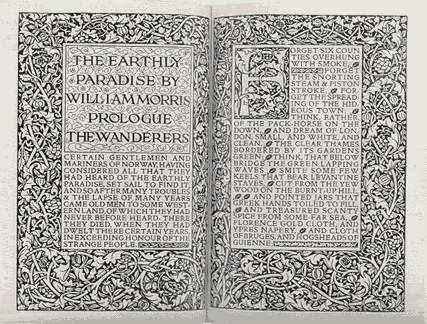
I often write about William Morris' designs and prose works, but today I thought I'd include a small exctract from his most beloved poem (and this site's namesake), The Earthly Paradise.
Written between 1868 and 1870, The Earthly Paradise was Morris' most successful work. Originally published in four parts, today it is usually sold as one volume (my 1905 edition is 445 pages!). Luckilly, the poem is made up of twenty-four long narrative poems that are tied together in a framework similar to Chaucer's Canterbury Tales (you will recall that in the Canterbury Tales, the travelers entertain themselves by taking turns telling stories while on a pilgrimage, so it's actually quite easy to read.
In The Earthly Paradise, a group of "gentlemen and mariners of Norway," lured by the prospect of discoverying a mythic Earthly Paradise, have become stranded on an island in the middle of nowhere, where they discover the descendants of a group of Greeks who landed there long ago. Together, the islanders and Norse strangers gather each month for a year, and tell lovely stories from ancient sources--Greek and Norse. Thus, the poem is also divided by month (with two stories, one Norse, one Greek for each month of the year).
The poem is highly entertaining and very easy to read (there's some archaic language, but overall it's modern english).
What follows is a small extract from the prologue to The Earthly Paradise. In this section, Morris is asking his readers to seperate themselves from the reality of their modern lives and to try and imagine the world of Geoffrey Chaucer's time, in which his poem is set:
Forget six counties overhung with smoke,
Forget the snorting steam and piston stroke,
Forget the spreading of the hideous town;
Think rather of the pack-horse on the down,
And dream of London, small and white and clean,
The clear Thames bordered by its gardens green;
Think, that below bridge the green lapping waves
Smite some few keels that bear Levantine staves,
Cut from the yew wood on the burnt-up hill,
And pointed jars that Greek hands toiled to fill,
And treasured scanty spice from some far sea,
Florence gold cloth, and Ypres napery,
And cloth of Bruges, and hogsheads of Guienne;
While nigh the thronged wharf Geoffrey Chaucer’s pen
Moves over bills of lading—mid such times
Shall dwell the hollow puppets of my rhymes.
If you would like to read more, the text to The Earthly Paradise is available online at The Internet Sacred Texts Archive's website. Curling up with a good book is always more fun, even if it isn't free, so if you like what you've read, you can always get a lovely hardback version. Amazon doesn't seem to have anything under $400, but Alibris has affordable copies starting $6.68!
(image courtesy of www.morrissociety.org)


3 comments:
Hello, thanks for sharing this extract with us. I noticed in the post below that you mentioned the William Morris house, it is one I'm hoping to visit. We love visiting Standen which is a National Trust property now in East Grinstead and is full of Arts and Crafts treasures, a gem
Kimx
We can learn much from the past!
I love this extract...It's been years since I read The Earthly Paradise, so it was great to re-encounter it here--thank you! I learn so much here :o) Happy week ((HUGS))
Post a Comment